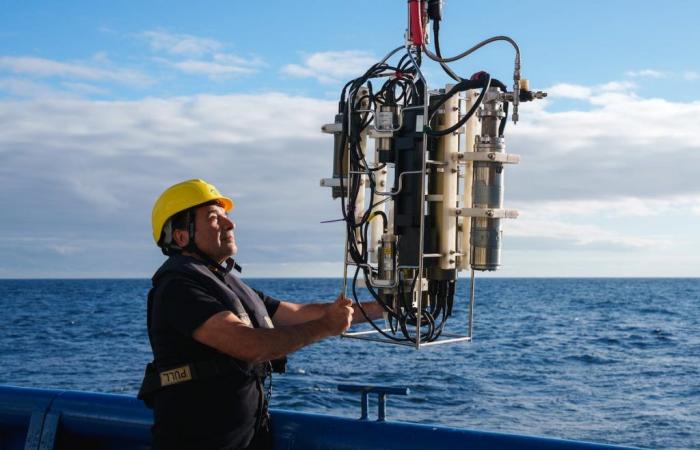On April 12, Osvaldo Ulloa (Santiago de Chile, 63 years old), doctor in Oceanography and master’s degree in Marine Biology, embarked on the cruise of the non-profit organization Schmidt Ocean Institute – created by Eric Schmidt, former CEO of Google – along with 24 scientists from institutions in Spain, the United States, Denmark, Sweden and Chile. For five weeks, the group navigated through two stations – one 15 miles from the coast and the other 100 miles – off Iquique, in northern Chile.
The objective of the research was to study a Minimum Oxygen Zone (MOZ) present in the South Pacific Ocean, between 100 and 400 meters deep. The name of these places implies that there is a tiny amount of oxygen in these waters, but a team led by Ulloa discovered in 2010 that they actually do not have any oxygen: “We worked with a Danish researcher who had invented a new detector that could measure oxygen very precisely, and there it was observed that there is no oxygen at all. That, among other things, meant that all the previous data are incorrect in the literature,” explains the academic from the University of Concepción and director of the Millennium Institute of Oceanography to EL PAÍS in a video call. They are still called Minimum Oxygen Zones for a historical reason, he comments: “In a 2012 paper we called them Anoxic Marine Zones and some authors use this term.”
For physical and chemical reasons there are three of these zones in the world: in the Indian Ocean, in the northern tropical Pacific and in the southern tropical Pacific (off Peru and Chile). But climate change is changing the landscape. In recent decades, scientists have seen how these places have expanded throughout the planet’s waters. “Data from the 1960s onwards are showing that these zones are expanding in all oceans where they are present. On the other hand, climate models, which are used to predict how the planet will function in the future, show that there is a decrease in oxygen globally. So, on the one hand, the observations and, on the other hand, the models, are telling us that the oceans with global warming are losing oxygen,” explains the oceanographer. “These areas, although in terms of volume they are small compared to the rest of the ocean, it is here where these processes occur that impact the entire planet,” he emphasizes.
The dimensions of this impact are still unknown: “These are large-scale phenomena and we still do not know well how the ocean will respond to climate change (…) What is clear is that, if you warm the ocean, you will to have less oxygen,” emphasizes Ulloa. He also comments that it is an area of study that went unnoticed for a long time: “The truth is that if you name the phenomena resulting from the impact of climate change on the oceans, deoxygenation is not one of the things that is talked about.” Normally, in recent years this has gained more strength. “We hear much more about the acidification of the oceans or the bleaching of corals due to the effect of temperature change.”
The objective of the recent expedition in which Ulloa participated was to analyze these areas in order to understand the future, but also the past. “Life was born and evolved without oxygen, half of the planet’s history was without oxygen,” says the biologist.
“In Chile we naturally have these waters without oxygen, that is why scientists from other parts of the world are interested in coming to study here, because we have the condition that is going to occur in other parts of the world and the species that are here are adapted to these conditions,” details the oceanographer.
Lack of oxygen decreases productivity in the oceans. Without this element, algae cannot photosynthesize and phytoplankton is the main food of marine species. Life in the oceans, as we know it, could cease to exist. But that does not mean that there is no life: “These areas are called in English the dead zones, and it turns out that, what there is not, is large life, of fish, of the things that humans care about, but microorganisms exist and they are super abundant (…) Although there is no oxygen, there will still be microorganisms adapted and they will respond to this. If that is good for us or not, I don’t know, but for the environment it is,” explains Ulloa and says that Chile has a privileged habitat in this sense: “If there is something that Chile is known for, in terms of marine sciences and oceanography, it is for marine microbiology.”
With no oxygen available, these microorganisms use molecules such as ammonia and nitrate to obtain energy, and release nitrous oxide as a byproduct, a greenhouse gas 245 times more powerful than carbon dioxide.
On this occasion, scientists used new technologies to understand this ecosystem. One prototype that is at the forefront is the Submersible Incubation Device (SID), which is an autonomous laboratory on site which measures microbial activity in the environment, allows samples to be taken directly from the ocean and prevents them from being contaminated by manipulation. The data collected during the expedition will be further analyzed in land-based laboratories.
Ulloa says that it is a privilege that Chilean scientists can participate in these expeditions, but that the area still needs a push in the South American country: “In Chile there is no national oceanographic institute, all other countries have institutes and Chile does not. There is also no national ocean research program, that is, from an institutional point of view we are well behind, but from a scientific point of view we are very well positioned. In oceanography we are fighting for first place in Latin America with Brazil. One year it’s us, another year it’s them,” he says.
Subscribe here to the EL PAÍS Chile newsletter and receive all the key information on current events in the country.






